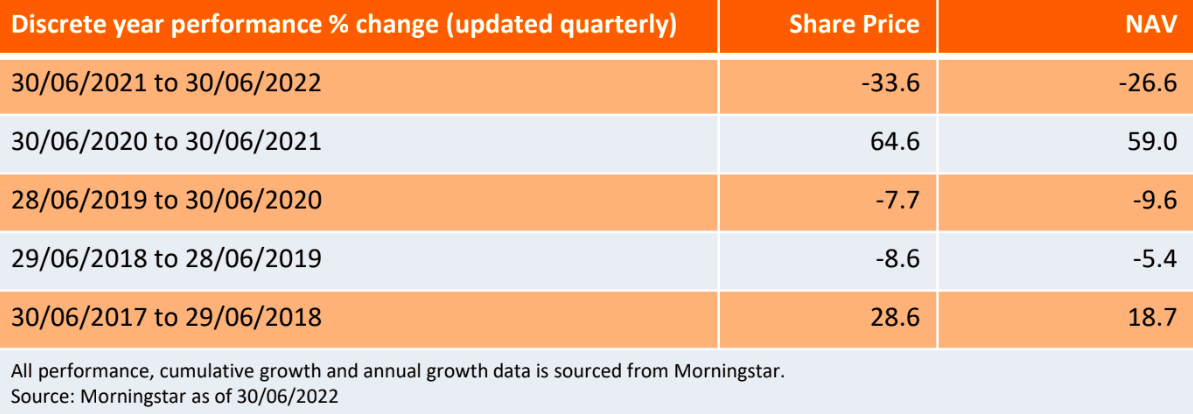
Neil Hermon, Portfolio Manager of The Henderson Smaller Companies Investment Trust, provides an update on the Trust highlighting the key drivers of performance over the quarter, areas where he finding opportunities, and provides his outlook for UK stocks in the coming months.
Macro backdrop
UK equities dropped over the quarter due to worries about inflation, monetary policy tightening and the growing risk of an economic downturn. Annual inflation hit a 40-year high of 9.1% in May, up from 9.0% in April, while the Bank of England (BoE) raised interest rates for the fifth time in as many meetings, by 25 basis points (bps) to 1.25%.¹ The BoE also warned that the UK faced a recession, while consumer confidence hit record lows in May and June. GDP growth unexpectedly shrank in April by 0.3%, and growth moderated to 0.8% over the first quarter of 2022 -the weakest level in a year.² The jobs market remained strong, however, with the number of people in full-time employment and job vacancies both at all-time highs. Sterling weakened against the US dollar, weighed down by the largely downbeat economic news, trade tensions with the European Union and the prospect of another independence referendum in Scotland. Smaller companies underperformed their larger counterparts with the Numis Smaller Companies ex-Investment Companies Index down 11.7% against a fall in the FT All-Share of 5.0%.³
Trust performance and activity
The Trust fell 15.8% over the quarter while the Numis Smaller Companies ex-Investment Companies Index returned -11.7%.³
The Trust’s biggest contributors to performance included Euromoney, Serco and Alpha Financial Markets Consulting. Euromoney, a provider of business information, rose after the company announced it had received a takeover approach from a private equity group. Serco, a provider of outsourcing services, rose after the company raised its earnings guidance due to strong trading and contract wins. Alpha Financial Markets Consulting, a provider of consultant services to the fund management industry, rose after the company reported results showing strong growth and a confident outlook on the coming year.
The Trust’s biggest detractors to performance included Impax Asset Management, Future and Watches of Switzerland. Impax, an ethical fund manager, and Future, a specialist media group, fell in the period due to a rotation away from quality growth stocks and towards value stocks. Watches of Switzerland, a luxury watch retailer, suffered from the same rotation but also worries about the outlook for consumer spending.
In terms of activity, we initiated a position in Rathbones, the private client wealth manager. The company has a leading position in a historical long-term structural growth industry along with a very strong brand. The bid for Brewin Dolphin has highlighted value in the sector and although short-term profitability is being depressed by information technology investment and weak equity markets, the longer-term outlook is strong in our view. We also initiated a position in Workspace, a provider of short lease properties in the South East of England. We were attracted by the potential recovery in rents and occupancy following the COVID-19 pandemic and the significant discount the shares were trading at compared to net asset value.
We sold our position in Brewin Dolphin, the private client wealth manager, after the company had received an agreed bid from Royal Bank of Canada. We also sold Frontier Developments, the computer games developer and publisher, as we were concerned that the sales projections for some of its forthcoming titles looked overly ambitious. Meanwhile, the sector is seeing mounting cost pressure. We sold our position in Dechra, a supplier of veterinary products, as its recent elevation to the FTSE 100 Index has meant it is no longer appropriate for the portfolio.
Outlook/strategy
Just as the impact of the COVID-19 pandemic on the global economy was starting to abate, the world is faced with a new crisis. The conflict between Russia and Ukraine has dramatically shifted the balance of global geopolitics. In the short term, this has led to a significant jump in oil and other commodity prices, sanctions on the Russian economy, and a humanitarian crisis in Ukraine. The longer-term implications are probably as material, with the isolation of Russia as a pariah state, a stronger more unified Europe and NATO, materially higher defence spending and an urgent need to reduce European dependence on Russian oil and gas supplies. This has exacerbated inflation, added to the burden on government spending, dampened animal spirits and hurt economic growth.
With inflation prints continuing to remain elevated against both official targets and market forecasts, central banks, led by the US Federal Reserve, have become increasingly hawkish. The market is now forecasting further significant rises in interest rates globally and a move from quantitative easing to tightening. Oscillating confidence levels in central banker’s willingness and ability to strike the right balance between containing inflation and supporting economic growth is driving heightened levels of uncertainty and volatility in global equity markets.
The rapid rise of inflation, particularly driven by energy prices but also by a wider number of other components, is putting pressure on consumers. Although the labour market is strong and wages are rising, real net disposable income is falling and consumer confidence is low. Higher energy prices particularly impact lower income households, and this has prompted the UK government to bring in measures to help this socioeconomic group. Sectors exposed to consumer spending are likely to face tougher trading as we move through 2022 and into 2023.
In the corporate sector, conditions are intrinsically stronger than they were during the Global Financial Crisis of 2008-2009. In particular, balance sheets are more robust. Dividends have been recovering strongly and we are seeing an increasing number of companies buying back their own stock. We saw a noticeable pick-up in corporate activity last year. However, after an active 2021, the initial public offering (IPO) market has become considerably quieter as equity market confidence has diminished. Merger and acquisition (M&A) activity has remained robust as private equity in particular looks to exploit opportunities thrown up by the COVID-19 pandemic and the recent equity market pullback. We expect this to continue in the coming months as UK equity market valuations remain markedly depressed versus other developed markets.In terms of valuations, the equity market is now trading below long-term averages. Corporate earnings were sharply down in 2020 although we have seen a sharp recovery in 2021. We think is likely to continue into 2022 although a weakening economic environment is likely to dampen expectations. Although uncertainty remains around short-term economic conditions, we think that the portfolio is well positioned to deal with the uncertainties. The movements in equity markets have thrown up some fantastic buying opportunities. However, it is important to be selective as the strength of franchise, market positioning and balance sheets will likely determine the winners from the losers.

³ Source: Bloomberg as at 30 June 2022
Growth investing -Growth investors search for companies they believe have strong growth potential. Their earnings are expected to grow at an above-average rate compared to the rest of the market, and therefore there is an expectation that their share prices will increase in value.
Gross domestic product (GDP) – The value of all finished goods and services produced by a country, within a specific time period (usually quarterly or annually). It is usually expressed as a percentage comparison to a previous time period, and is a broad measure of a country’s overall economic activity.
Monetary policy – The policies of a central bank, aimed at influencing the level of inflation and growth in an economy. It includes controlling interest rates and the supply of money. Monetary stimulus refers to a central bank increasing the supply of money and lowering borrowing costs. Monetary tightening refers to central bank activity aimed at curbing inflation and slowing down growth in the economy by raising interest rates and reducing the supply of money.
Recession – A recession is a macroeconomic term that refers to a significant decline in general economic activity in a designated region.It had been typically recognised as two consecutive quarters of economic decline, as reflected by GDP in conjunction with monthly indicators such as a rise in unemployment.
Value stocks – Value investors search for companies that they believe are undervalued by the market, and therefore expect their share price to increase. One of the favoured techniques is to buy companies with low price to earnings (P/E) ratios.
Valuation metrics – Metrics used to gauge a company’s performance, financial health and expectations for future earnings eg, price to earnings (P/E) ratio and return on equity (ROE).
Quality investing – Quality investing is an investment approach that emphasises buying stocks of businesses that are financially stable or profitable when examined on one or multiple metrics.